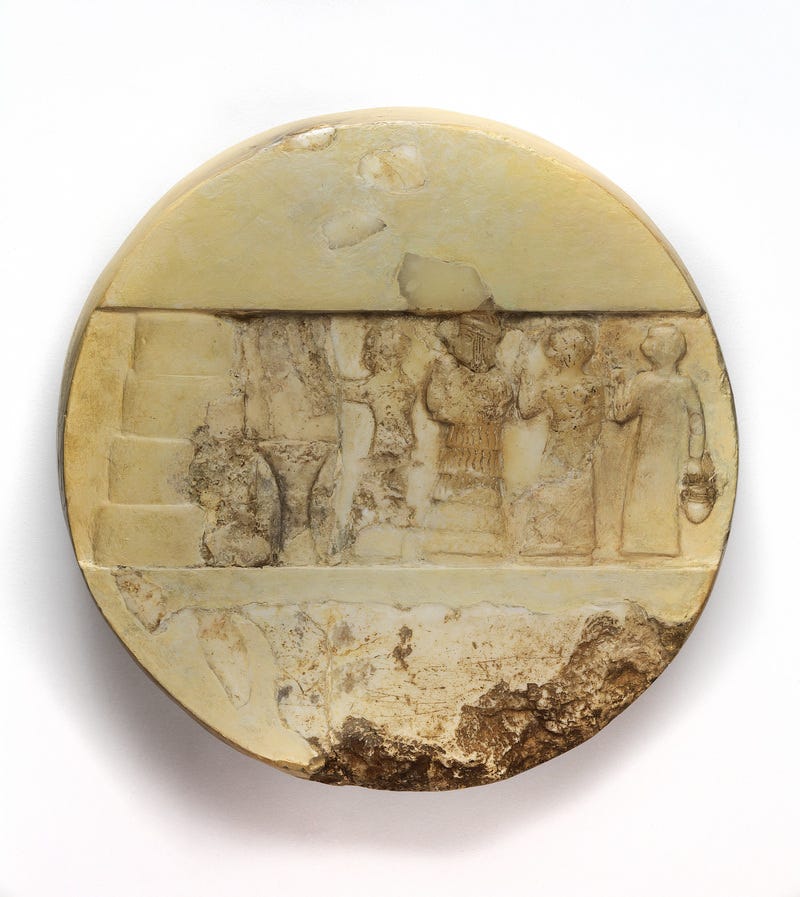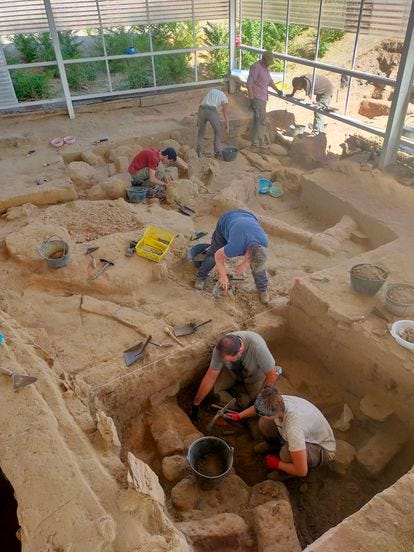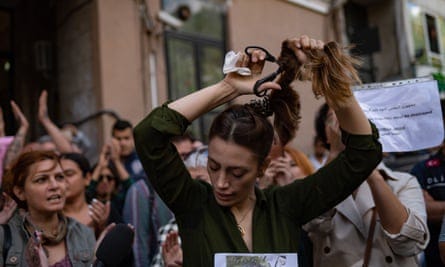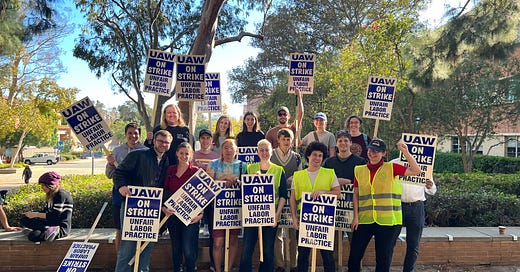Ancient/Now- December 2nd
Strikes, childhood, feminism, and Hathor— some of our top news from the past week!
UC Graduate Student Strike
Across the University of California campuses, including our very own UCLA, graduate student workers, researchers, and post docs are on strike concerning UC’s unfair labor practices. The strike has entered it 3rd week with researchers and post-docs reaching a tentative agreement, but nothing yet for TA’s or GSR’s (graduate student researchers). Many of UC faculty, like Kara, are in solidarity with the strike.
Graduate workers are requesting a increase in pay. One statistic found that graduate workers spend most of their pay on rent. For example at UCLA, workers earn $1863 on average, while rent costs $1454. Fair compensation is just one of the demands— see more here. Interested in ways to support the strike? Then head here!
More news coverage:
New Yorker— What’s at Stake in the University of California Graduate-Worker Strike
LA Times— Chaos over grades, finals and ongoing classes erupts as UC strike continues
Time— How the University of California Strike Could Reshape Higher Education
Monogamy. Grandmas. Milk. The Evolution of Childhood Is Very Strange.
This article examines 5 ways that human childhood is mystifying, including how difficult it is to be born (very very difficult…) and how damn long it takes to grow up. The article also discussed menopause, which only humans and certain kinds of whales go through, an evolutionary adaptation that provides caregiving from older women. Why would evolution allow grandma to have her own babies—difficult birth! Long upbringing!—when she can help raise her grandkids? We disagreed, however, with the section of the article claiming that monogamy is another human evolutionary strategy. Who said humans are monogamous??? Hunter-gatherer cultures do not promote monogamy at all. In more equalitarian communities sex is not restricted. And then there’s polygamy, which was common in the ancient world (ancient Egypt and Mesopotamia’s ‘second wife' tradition, for example), but polygamy is really just expanded and imposed monogamy for elite patriarchal men. Monogamy was created for patriarchy, to commodify and control women and their children, and since it has only lasted 6-7,000 years of a much longer human history, it is not an evolutionary trend. Indeed, the more we move towards anti-patriarchal lifestyles, the less monogamous we humans become. :)

The Struggle to Unearth the World’s First Author
Long described as the world’s first author, Enheduanna, did not receive her due from historians. Indeed, some scholars have argued that the texts she was said to have composed were not written by a single person at all, and certainly not a woman. Enheduanna’s memory has long been subject to the social theories of the time—from patriarchal expectations to second-wave feminism to postmodern thinking. Now, in a new exhibition at The Morgan, Enheduanna is placed in the context of her time, alongside other Mesopotamian women of the late fourth and third millennia B.C.E., and in that context she is perfectly positioned to fulfil the role of “first author.” She was highly unusual for her time, yes, but she was also elite, gaining all the privilege and education that comes to someone in her station. Her father was Sargon of Akkad, arguably the world’s first imperialist. She had the profession (high priestess), time (lots of servants to do her bidding) and subject matter (personal experience of war and trauma) to pour into her writings. Here’s a little snippet from the world’s first author, a woman who lived over 4000 years ago:
…I, En-ḫedu-ana the en priestess, entered my holy ĝipar in your service. I carried the ritual basket, and intoned the song of joy. But funeral offerings were brought, as if I had never lived there. I approached the light, but the light was scorching hot to me. I approached that shade, but I was covered with a storm. My honeyed mouth became scum. My ability to soothe moods vanished… (The Exaltation of Inana: 66-73)

‘Puzzling’ archeological find in Spain uncovers objects with Egyptian motifs
Researchers excavating in Spain have found a fragment of a faience Hathor head. What a great piece to show the interconnectivity of the greater Mediterranean basin! Thought to be brought to Spain by Phoenician traders, the researchers are still confused as to how the piece ended up so far inland. Were people at the site worshipping Hathor like later traditions of Isis worship, or was the faience piece part of a luxury goods trade?

The power of women: acclaimed Italian author Elena Ferrante on patriarchy and protest in Iran
“Being a woman is a political act.” What powerful words from journalist Shiva Akhavan Rad. As we watch the ongoing women’s right struggle in Iran, it is important to consider current forms of feminist within anti-patriarchal movements. As Ferrante says:
We women, wherever we are in the world, are immersed in male culture from birth. Language is male, the family is male, religion is male, laws are male, government institutions are male, literature is male, the arts are male, the sciences are male, education – both male and female – is male.
What do I mean? I mean that, in all of our manifestations – even the perception of our body, even maternity – we assume the form of a woman through the forms that patriarchal domination has invented for us over millennia.
With more and more anti-patriarchal pushes, there will also be great push backs, authoritarian moves, and ideological control. All that was invented in the ancient patriarchal world is being questioned. And we are here for it.







